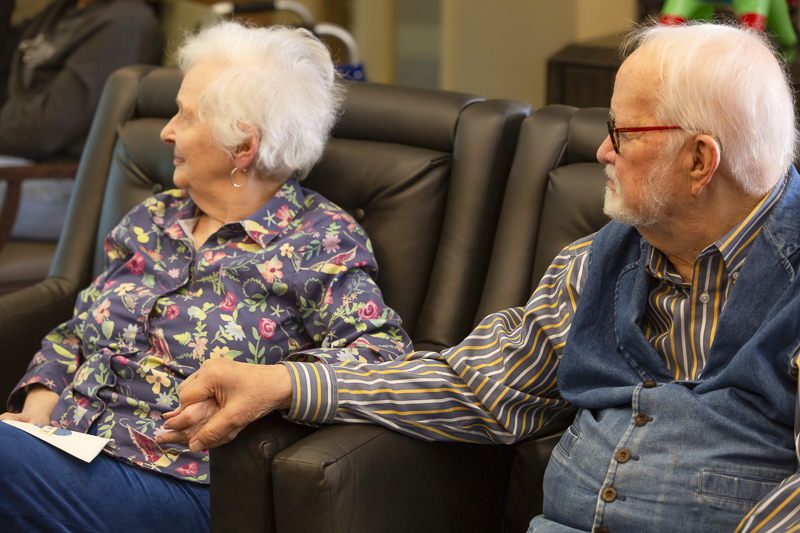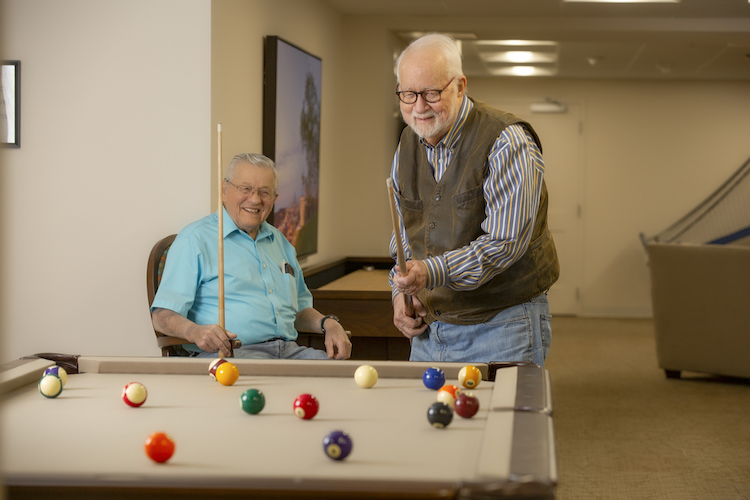Regardless of your or your loved one’s health status, St. Anthony’s is an inviting environment for seniors to create a customized plan to thrive. We welcome residents experiencing various health conditions, including different stages of Parkinson’s disease. Our team is highly trained to care for Parkinson’s patients in every living option, from Memory Care and Assisted Living to Independent Living.
More than 10 million people worldwide deal with Parkinson’s disease daily, but the range of symptoms and abilities vary significantly. So how do you know when it’s time for your loved one to move to assisted living at a senior living facility? It all depends on their unique situation and ability to care for themselves.
What Exactly is Parkinson’s Disease?
Parkinson’s disease is characterized by the loss of specific nerve cells in the brain, damaging several brain areas over time. The most common symptom is limited or lost mobility, as affected cells lose dopamine (an essential brain chemical for movement).
The most common symptoms of Parkinson’s disease are tremors or involuntary shaking, slowed movement, and stiff muscles. Many other possible symptoms aren’t directly related to physical mobility, such as balance issues, lost sense of smell, insomnia, poor mental health, and even memory loss.
Five Stages of Parkinson’s Disease
The progression of Parkinson’s disease is typically categorized into five stages. Understanding what stage your loved one is experiencing can help you determine the level of support they need.
Remember that Parkinson’s disease progresses at different rates for different people. While one person may move through the stages in the span of months and need to move quickly to senior living, others may be able to live comfortably and independently with Parkinson’s disease for many years.
1. Minor Movement Changes
In the early stages of Parkinson’s disease, seniors can still perform everyday tasks and live independently. However, they may begin experiencing some stiffness and altered movement. Tremors and involuntary movements can happen in this early stage. Limited mobility and tremors might only occur on one side of the body. Many of these changes are relatively minor and may not even be noticeable.
2. Stiffness and Posture Issues
As Parkinson’s disease progresses into the second stage, symptoms are more noticeable and significant. Seniors living with Parkinson’s disease may also experience changes in their facial expressions and have noticeably poor posture.
Daily tasks may become more challenging at this stage, and it may be wise to start considering senior living options for your loved one. For instance, they might want to downsize from a large house with stairs and consider a senior living community. As an independent living resident at St. Anthony’s, your loved one will have access to amenities such as housekeeping, grounds maintenance, and five-star-quality dining to ease the load and help them live more comfortably.
3. Reflex and Balance Problems
If your loved one has been living at home throughout stages one and two, they might want to consider a downsized living situation or senior living community when their Parkinson’s progresses to stage three. In this stage, balance becomes an issue, making stairs and homes with trip hazards potentially dangerous. Their reflexes may also diminish, but medication and therapy can make it possible for seniors in stage three to still live comfortably in an independent living suite at St. Anthony’s.
4. Impacted Motor Skills
When Parkinson’s disease reaches stage four, independence may become unsafe and impractical. At this stage, motor skills are significantly impacted, and most seniors in stage four will require a walker or assistive mobility equipment. While some may still be able to live alone in this stage, the increased difficulty with movement and significantly reduced reflexes may make it unsafe to do so.
5. Debilitating Stiffness
In this final stage of Parkinson’s disease, your loved one will be most safe and comfortable in an assisted living or memory care setting. All symptoms progress significantly in this stage and can become extremely debilitating. This rapid progression also impacts more than physical abilities and can include symptoms of confusion, hallucinations, and delusions.
Signs It May Be Time for Assisted Living or Memory Care
While some may require assisted living in stage three, other seniors with Parkinson’s disease can live independently all the way until stage five. So how do you know when it’s time for your loved one to consider senior living? How do you know when they require assisted living or memory care? Here are some signs to look out for:
- Missed meals and weight loss may signify your loved one either forgetting to eat or being physically incapable of preparing a meal or grocery shopping.
- Medication errors are common as Parkinson’s progresses and the number of medications a senior must take increases. If you or your loved one are having difficulty managing the medication schedule, this is something that St. Anthony’s can help with.
- Poor hygiene isn’t a symptom of laziness. If your loved one is living with Parkinson’s disease, they may find activities of daily living (ADLs) such as bathing, getting dressed, and using the bathroom challenging to handle independently.
- Isolation can also be a sign of progressing Parkinson’s disease, especially if your loved one is known to be more of a social butterfly. Senior living may be just the thing to help them feel less alone and find a community of peers to connect with.
Get the Care You Need Without Sacrificing Autonomy
Moving into a senior living community and opting for assisted living doesn’t mean giving up on your loved one — it’s actually the opposite! You are helping them to live as independently as possible while still getting the care they need.
At St. Anthony’s, our care team assesses each resident individually, working with them and their families to ensure they have all the support they need to enjoy the life they love. Contact us today to learn more and schedule a tour!




